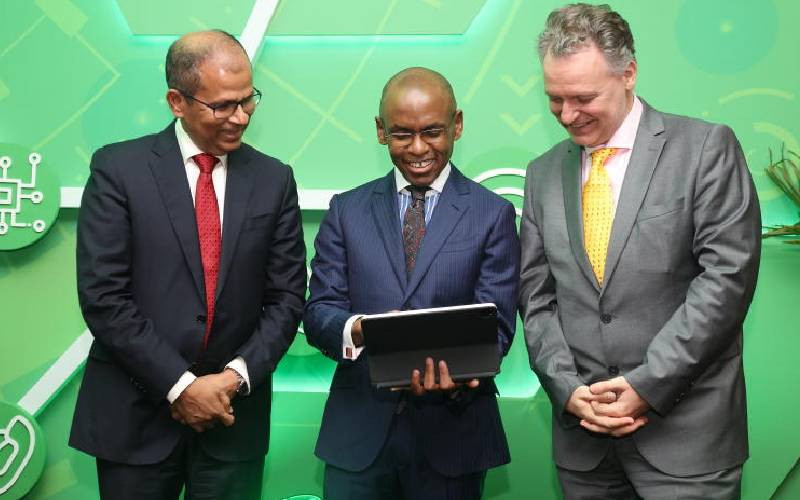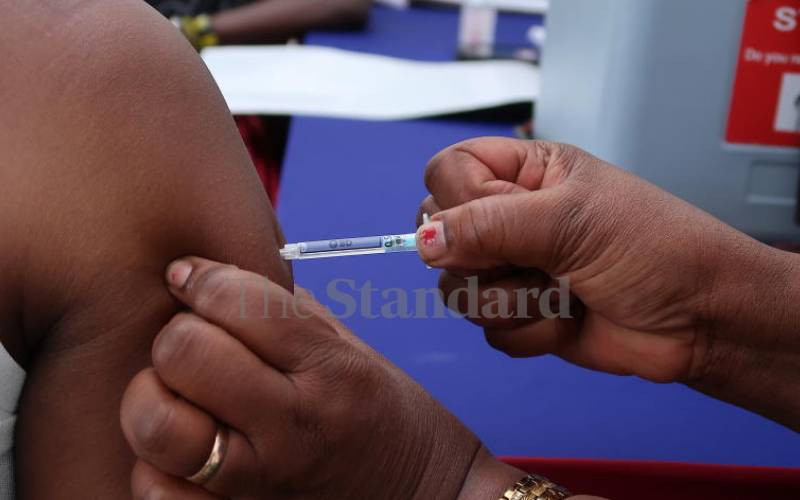 |
|
From left, Safaricoms Director Technollogy Thibaud Rerolle, Safaricom CEO Bob Collymore and Huawei CEO Dean Yu JPG |
NAIROBI: Safaricom Thursday launched Kenya’s first fourth-generation (4G) Internet service, a move likely to strengthen its hold on the country’s growing ICT-based economy.
The launch of the new network also known as LTE Advanced will provide Safaricom subscribers with Internet speeds of up to two times of what they currently experience on 3G. The operator, which is the region’s largest in profitability, is seeking to further grow its data business to counter slowing voice segment. The firm’s Chief executive Bob Collymore is confident that the new network would bolster the company’s data offering.
“Today’s launch progresses our strategic push to democratise data. We believe in the transformative power of the Internet and are keen to deliver the most advanced technologies to our subscribers in order to remain the network of choice,” he said.
In addition to deploying the new network, the company has stated that it will offer affordable devices through its partnerships with by global phone manufacturers. Mr Collymore said Safaricom is keen to supply affordable 4G-enabled devices including phones, routers and modems to the market, with a sub Sh9,000 phone planned for early next year.
The launch of Safaricom’s new network comes at a time when mobile service providers in the country are struggling to capitalise on other sources of revenue as traditional sources like voice and SMS have registered declined growth rates.
Safaricom, which has created a formidable business from its data and mobile money transfer business has had its dominance threatened by the entry of Kenya’s financial giant Equity Bank into the mobile money transfer space with its new subsidiary Equitel.
DATA INCREASE
The operator saw its revenue from data increase by more than half in the six months to September. The company last month announced impressive first-half pretax numbers with profits rising by almost a third to sit at Sh21.1 billion in the half-year ended September. Revenues from data and M-Pesa services made up almost 40 per cent of the revenues with the company’s voice division growing by just 6 per cent over the same period.
Safaricom will be spending Sh32 billion shillings on it’s network this financial year up from Sh27 billion shillings the previous year with Chinese telecommunications firm Huawei providing the infrastructure support for the LTE rollout. The launch of the network by Safaricom is a feather in the cap for the mobile service provider which last year pulled out of talks to establish a shared 4G network infrastructure on a government and private sector partnership model.
 The Standard Group Plc is a
multi-media organization with investments in media platforms spanning newspaper
print operations, television, radio broadcasting, digital and online services. The
Standard Group is recognized as a leading multi-media house in Kenya with a key
influence in matters of national and international interest.
The Standard Group Plc is a
multi-media organization with investments in media platforms spanning newspaper
print operations, television, radio broadcasting, digital and online services. The
Standard Group is recognized as a leading multi-media house in Kenya with a key
influence in matters of national and international interest.
 The Standard Group Plc is a
multi-media organization with investments in media platforms spanning newspaper
print operations, television, radio broadcasting, digital and online services. The
Standard Group is recognized as a leading multi-media house in Kenya with a key
influence in matters of national and international interest.
The Standard Group Plc is a
multi-media organization with investments in media platforms spanning newspaper
print operations, television, radio broadcasting, digital and online services. The
Standard Group is recognized as a leading multi-media house in Kenya with a key
influence in matters of national and international interest.








